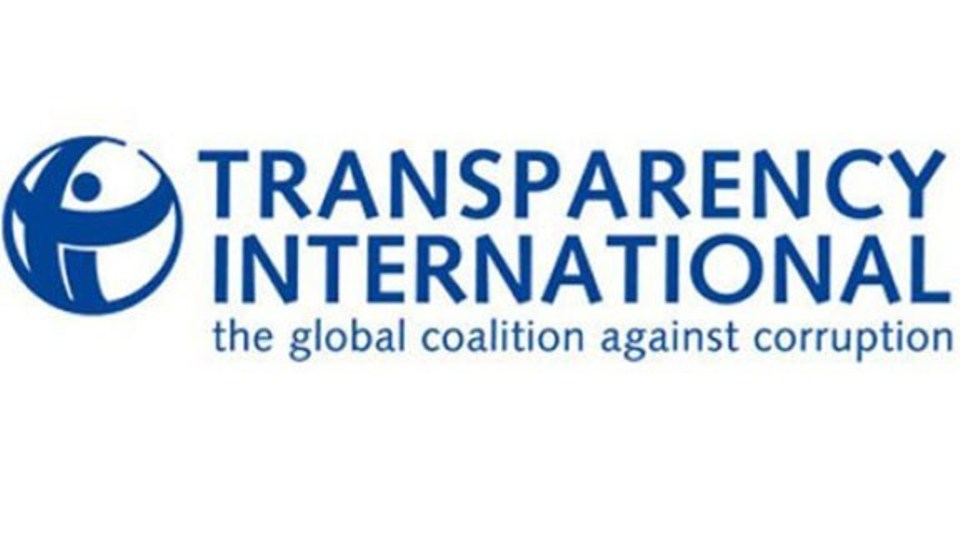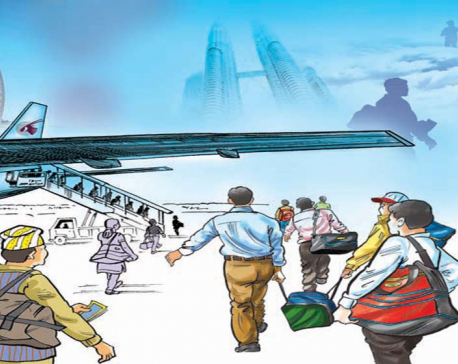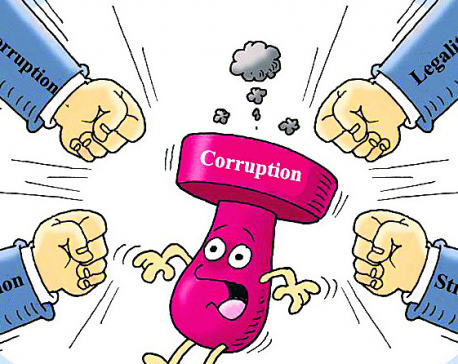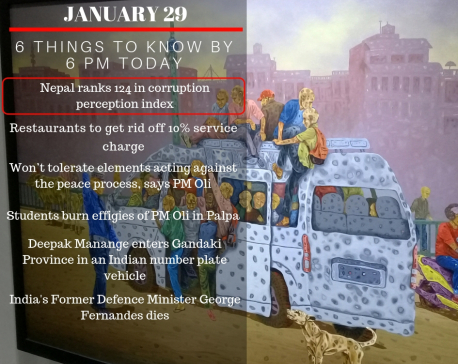
OR
Corruption Barometer for Asia
84 percent of people in Nepal think that government corruption is a big issue: TI report
Published On: November 25, 2020 12:30 PM NPT By: Republica | @RepublicaNepal

KATHMANDU, Nov 25: The perception of people who think government corruption is a big issue in Nepal has increased significantly in Nepal in the past one year, according to the report-- Global Corruption Barometer (GCB) – Asia-- released by Transparency International (TI) on Tuesday.
A total of 84% of people think that government corruption is a big problem in Nepal, according to the finding. Those who believe that corruption has increased in Nepal in the past one year stand at 58 percent, according to the GCB.
Experts argue that the percent of 84 percent of people in the country that government was involved in huge corruption shows that corruption has reached its extreme in the country. The findings come in stark contrast to the claim made by Prime Minister K P Oli that his government does not involve in corruption and does not let others involved in corruption as well.
Similarly, 12% of public service users said they were forced to pay a bribe in the previous 12 months. According to the findings of the survey, 43 percent of people think that most or all people in the bureaucracy and the members of parliament are corrupt and 40 percent of people think that local government officials are involved in corruption.
Similarly, 28 percent of people think that police personnel are involved in corruption. The percentage of people who think that judges and magistrates are involved in corruption stands at 24, according to the survey conducted by Transparency International. Based on the survey, the overall bribery rate in the country stands at 12 percent, which experts say is a little too high.
The bribery rate stands high in the public institutions that issue various kinds of government identity cards, with 13 percent of respondents saying that they were forced to pay bribes to avail of the service. Next on the list is the police, according to the TI Survey. A total of 12 percent of people said they were made to pay bribes in the police institutions to get their job done.
The TI survey further revealed that 12 percent of people pay bribes in utilities, 7 percent in public schools, and 3 percent in public clinics and health centers.
The report released by the TI said that citizens across 17 countries in Asia report stagnant or rising levels of corruption, undermining equitable access to public services and trust in government. Three-quarters of respondents believe that government corruption is a big problem in their country, with nearly one in five people (19 percent) paying a bribe when accessing public services in the previous year. This is equivalent to about 836 million people.
In addition to bribery, the use of personal connections to access public services is also prevalent across Asia. The results found that more than one in five people (22 percent) who accessed public services used their personal connections to receive the assistance they needed.
When asked why, 24 percent of people who paid bribes said they were asked to do so, while 30 percent of people who used personal connections said they would not have received the service otherwise. “This suggests that people are paying bribes to speed up essential services, highlighting red tape and inefficient bureaucracy, while pushing those without the means at their disposal to the back of the queue,” said a press statement issued by the TI on Tuesday.
Age is another important factor. Young people aged 18 to 34 are more likely to pay a bribe or use personal connections than any other age group, according to the report.
Interestingly, the survey conducted by TI found corruption around elections is also prevalent, posing a serious threat to democracy itself. Nearly one in seven people were offered bribes in exchange for votes at a national, regional, or local election in the past five years.
“Protecting the integrity of elections is critical to ensuring that corruption doesn’t undermine democracy,” the statement quoted Chair of Transparency International Delia Ferreira Rubio as saying. “Throughout the region, election commissions and anti-corruption agencies need to work in lockstep to counter vote-buying, which weakens trust in government.”
The GCB is one of the largest, most detailed surveys of citizens’ views on corruption and experiences of bribery in 17 countries across the region. The GCB surveyed nearly 20,000 people in Asia from March 2019 – September 2020. Due to the COVID-19 outbreak, most interviews for this survey were conducted via telephone using random digital dialing (RDD) with quota control as a sampling approach.
You May Like This

Awakening Nepal: A Stark Warning
In the land of the Himalayas, where the majestic peaks have long symbolized the heights of human potential, Nepal finds... Read More...

Nepal’s Corruption Crisis
The onus also lies on the ordinary citizens to end the corruption. All citizens should demand accountability and transparency from... Read More...

JAN 29: 6 things to know by 6 PM today
Your daily dose of missed important news of the day. ... Read More...

Just In
- World Malaria Day: Foreign returnees more susceptible to the vector-borne disease
- MoEST seeks EC’s help in identifying teachers linked to political parties
- 70 community and national forests affected by fire in Parbat till Wednesday
- NEPSE loses 3.24 points, while daily turnover inclines to Rs 2.36 billion
- Pak Embassy awards scholarships to 180 Nepali students
- President Paudel approves mobilization of army personnel for by-elections security
- Bhajang and Ilam by-elections: 69 polling stations classified as ‘highly sensitive’
- Karnali CM Kandel secures vote of confidence


















Leave A Comment